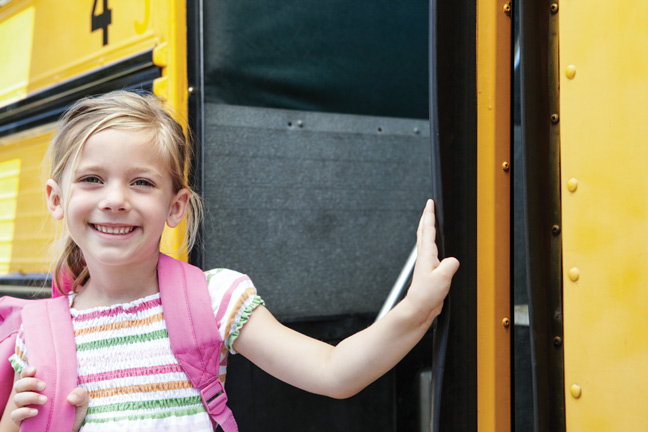The days are growing shorter as the angle of the sun shifts. The lush green of summer is giving way to the vibrant colours of fall. The air is crisp and clear, scented with falling leaves. Cooler temperatures—in some places more rain, like here on the wet coast—signal it's time to get out the warmer clothes (and umbrellas).
I love the fall; it's my favourite season. In the past, fall meant the year was nearing its end as people hunkered down for winter after the harvest. But in our post-agricultural, post-industrial age with more than a century of public education, fall means the end of summer days and the beginning of a new school year. In my line of work, it means the beginning of a new church year. Program leaders, boards and planning committees meet to plan the “year”—the next 10 months of busyness before we break again for the summer.
Maybe that's why I like the fall. It's all about starting new things. For many children, the days leading up to September will include trips to the store to buy school supplies, new clothes and bigger shoes. For parents, it's back to packing lunches, getting the kids to school and spending more money.
But for some children and their parents, fall doesn't bring the excitement of a new start. It brings the embarrassment of trying to hide not having the “right” school supplies or enough to eat at lunch because their family shops in second-hand stores and food banks. It brings frustration over not being able to concentrate because they're hungry. It brings the dread of teasing and shunning.
Perhaps one reason for the popularity of the Harry Potter series was its realistic portrayal of school life, and how cruel children can be. Children from struggling families could identify with the Weasleys, who wore hand-me-down robes and were often the target of sneering comments from the rich Malfoys.
We take so much for granted in life. For those of us who have jobs that can provide well for our families, the busyness of the new school and church year can blind us to the needs of others. My work over the years has shown me how much my family has compared to others, and we do our best to help in small ways, from supporting lunch programs to providing back-to-school supplies.
This fall, when we're signing our children up for sports teams, dance lessons and other out-of-school activities that cost money, let's remember that 15 percent of children in Canada live in poverty—children who will never dance on the stage or skate on the ice, stick in hand. Is there something we can do? Is there a way to help change the life of a child? Here are some ideas:
We can't solve the problem of poverty by ourselves, but we can help make a difference in the life of one child. This year, let the sense of excitement that autumn brings be a new beginning for a child in need.
Major Kathie Chiu grew up in The Salvation Army and has been an officer for 22 years. She has five children, including two teenaged boys still living at home, and eight grandchildren.
I love the fall; it's my favourite season. In the past, fall meant the year was nearing its end as people hunkered down for winter after the harvest. But in our post-agricultural, post-industrial age with more than a century of public education, fall means the end of summer days and the beginning of a new school year. In my line of work, it means the beginning of a new church year. Program leaders, boards and planning committees meet to plan the “year”—the next 10 months of busyness before we break again for the summer.
Maybe that's why I like the fall. It's all about starting new things. For many children, the days leading up to September will include trips to the store to buy school supplies, new clothes and bigger shoes. For parents, it's back to packing lunches, getting the kids to school and spending more money.
But for some children and their parents, fall doesn't bring the excitement of a new start. It brings the embarrassment of trying to hide not having the “right” school supplies or enough to eat at lunch because their family shops in second-hand stores and food banks. It brings frustration over not being able to concentrate because they're hungry. It brings the dread of teasing and shunning.
Perhaps one reason for the popularity of the Harry Potter series was its realistic portrayal of school life, and how cruel children can be. Children from struggling families could identify with the Weasleys, who wore hand-me-down robes and were often the target of sneering comments from the rich Malfoys.
We take so much for granted in life. For those of us who have jobs that can provide well for our families, the busyness of the new school and church year can blind us to the needs of others. My work over the years has shown me how much my family has compared to others, and we do our best to help in small ways, from supporting lunch programs to providing back-to-school supplies.
This fall, when we're signing our children up for sports teams, dance lessons and other out-of-school activities that cost money, let's remember that 15 percent of children in Canada live in poverty—children who will never dance on the stage or skate on the ice, stick in hand. Is there something we can do? Is there a way to help change the life of a child? Here are some ideas:
- Have a family meeting and choose a program you want to support.
- Decide together how much you can give. Perhaps your children will be willing to make a sacrifice to help others.
- When you are shopping for school supplies, buy two of everything. Let your children put the extra in their cart to be donated to The Salvation Army's annual back-to-school backpack program.
We can't solve the problem of poverty by ourselves, but we can help make a difference in the life of one child. This year, let the sense of excitement that autumn brings be a new beginning for a child in need.
Major Kathie Chiu grew up in The Salvation Army and has been an officer for 22 years. She has five children, including two teenaged boys still living at home, and eight grandchildren.










Leave a Comment